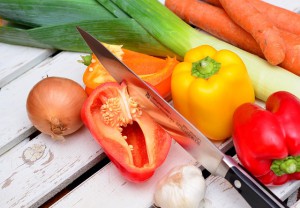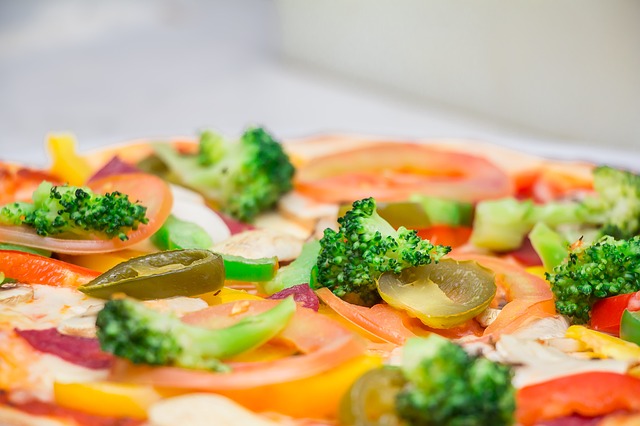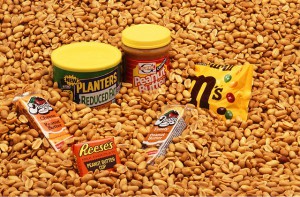 Ah, food; delicious food. Food is a necessity, yet it can wreak havoc on your body if you make poor food choices and have a bad relationship with food. On the opposite end of the spectrum to this, choosing healthy foods for losing weight can nourish and fuel your body to maintain a healthy weight range and peak condition.
Ah, food; delicious food. Food is a necessity, yet it can wreak havoc on your body if you make poor food choices and have a bad relationship with food. On the opposite end of the spectrum to this, choosing healthy foods for losing weight can nourish and fuel your body to maintain a healthy weight range and peak condition.
Of course if we extend this to a visual sense, you can either have a fit, toned and healthy body that is super sexy, or a flabby, bloated and weak one (and it can certainly show in a less attractive manner). Which category do you fall under?
Over one-third (Nearly 35% or 78.6 million) Americans are considered overweight, according to data from 2011-2012 (source). To oversimplify, obesity is caused by one or both of the following two factors:
- too much of the wrong kinds of food, and
- too little exercise.

photo credit: Malingering via photopin cc
In this article I’ll show you how you can lose any excess weight and maintain a healthy weight range through healthy food choices, even if you are doing limited amounts of exercise (though of course, I fully advocate exercising regularly!). You’ll also learn what foods will help you lose weight, how to integrate these into your diet, and what the top fat-gaining foods are that sneak into everyone’s diet under the guise of ‘healthy food’.
Focus on Eating Healthy
The human body is not meant to be unhealthy. It naturally gravitates towards a state of health – if you let it.
Food choices are a huge factor in your health, and weight. If you are overweight and want to lose weight, starting to eat healthy foods is your first port of call.
Sick of Calorie Counting? Me too.
 I’ve never been one for Calorie counting, though I do know roughly what my recommended daily intake of Calories is. The main thing to know about food and your weight is that if you want to lose weight then you need to eat at a Calorie deficit.
I’ve never been one for Calorie counting, though I do know roughly what my recommended daily intake of Calories is. The main thing to know about food and your weight is that if you want to lose weight then you need to eat at a Calorie deficit.
What does this mean?
Eat less Calories than you expend in energy (through exercise, and moving around). The good news is that your body uses energy just existing, so you’re already burning Calories just by being. Not bad, right?
If you want to count Calories then by all means go ahead, but I believe that eating healthy foods in moderation, you generally will be within a lower Calorie range and you will drop those unwanted pounds.
Eat in Moderation
One of the easiest things you can do to reduce your Calorie intake is to eat a little less at each meal. I’m not talking about going hungry. It doesn’t have to be a particularly noticeable amount less, but little changes add up considerably, so try reducing your portion size ever so slightly.
Another tip I find useful is to eat slower. Chew more (which also has the extra benefit of aiding greatly with digestion!), savor each mouthful and really enjoy your food. Eating slower and more consciously will enable you to be more in-tune with your body and feel when you are full. This way, you are able to realize when you have had enough food, and stop eating, as opposed to stuffing your face too fast and making yourself feel sick from overeating!
So What Makes a “Healthy” Food?
My definition of a healthy food is quite simple, and it’s more a ‘rule of thumb’ guideline than anything else.
Choose foods as close to natural as possible.
Foods such as the following are all rich in vitamins and minerals, antioxidants and healthy fats:
- Vegetables
- Fruits
- Nuts and seeds
- Legumes and beans
Having a close sister who is vegetarian, I may be biased :), but I believe that if you want to lose weight, your best option is to make the above food groups your main source of food that you eat.
I’m not debating that there are healthy animal products out there as well, such as fish and lean meats, but eating these less regularly will definitely help you lose weight because they are much more Calorie dense than vegetarian options.
Personally, I aim to get most of my food intake from fresh vegetable produce, going for as many different types and colors as I can to keep variety in my diet. Broccoli, green beans, bell peppers, tomatoes, avocados, pumpkin, carrots, onion, mushrooms and spinach are just a few of the staples that I love. I mostly eat vegetarian meals because my sister and I flat together, and share the cooking.

Why “Healthy” Food May Not Always be Healthy
When you go to the supermarket, there are so many products now that are being marketed as ‘healthy’, but the truth is that many of these so-called ‘natural and healthy’ foods are not that at all.
Marketing gimmicks abound in any product-based area, and the supermarket is no exception. Personally, I prefer to support my local farmers and buy fresh produce from local businesses and markets where I can.
Here are just some of the so called ‘healthy’ foods available in the supermarket that I usually try to stay away from, and I’ll tell you why in a minute:
- Cereals

- Crackers and biscuits
- Baked not fried chips
- Pasta sauces
- Juices
- Breads
- Wraps and tortillas
- Frozen meals
- Cheese
- Granola bars
Why I Choose to Avoid These ‘Healthy’ Foods
Okay, so by now you’re probably thinking I’m crazy, right? Maybe you disagree with me, and that’s fine. But I generally try to stay away from the above foods from the supermarket in general, and here’s why:
- They often contain hidden added sugars, salts, preservatives, coloring and/or fats.
- Most of these are highly processed foods, so a lot of the natural goodness gets destroyed.
For these reasons I would argue that a lot of these foods which are marketed as ‘healthy’ are in fact not-so-good for your health, or for losing weight. Extra sugar and fat can add a lot of unnecessary Calories.
Fruit Juice – Healthy or Not? 
Juices are a prime example of this, even the 100% from fruit, no added sugar ones. Fruit juice itself contains a lot of natural sugars, which aren’t bad – but I believe that drinking them in excess can be. As opposed to eating a piece of fruit, with a juice, you don’t get the fiber from the rest of the fruit that usually would be consumed. The natural sugars get absorbed a lot quicker than they otherwise would if fiber was present, and this makes your insulin levels spike.
Sugar makes your insulin levels increase, and insulin spiking can be a trigger to the body to go into ‘fat storage’ mode. Which I’m sure you’ll agree could be very counter-productive to losing weight!
 Of course there are some exceptions, like truly natural cereals (think muesli) which are not processed and have no added sugars or oils. Then there are breads which are close to natural and you actually can understand (and pronounce) the ingredients list. Those I don’t have a problem with, and I think these are healthy food options when consumed in moderation.
Of course there are some exceptions, like truly natural cereals (think muesli) which are not processed and have no added sugars or oils. Then there are breads which are close to natural and you actually can understand (and pronounce) the ingredients list. Those I don’t have a problem with, and I think these are healthy food options when consumed in moderation.
How To Choose Healthy Every Time
Simple – stick with the rule of thumb! Natural whole foods, which are processed as little as possible, are your best healthy food options for losing weight.
Cooking and Food Preparation
 You can ‘clean up’ your food by making these small changes to your food preparation and cooking:
You can ‘clean up’ your food by making these small changes to your food preparation and cooking:
- Stop adding butter to your cooking
- Cut down on adding sugar to your food or cooking. If you must, go for a natural sweetener instead of refined sugar.
- Don’t deep fry, or use too much oil in cooking
- Eat your food raw, lightly fried or steamed where possible. These are all healthier options than frying in oil
- Make your own sauces, dips, granola bars, you name it! You’ll know exactly what goes into your food and can keep it healthy!
Work on Your Willpower
A certain component of making the switch to eating healthy foods is willpower based – but the same principles apply to willpower around food as I wrote about in my post on willpower around working out. Practice makes perfect, and you can set healthy habits, one small change at a time.
Eat Healthy Foods For Life!
Eating healthy foods as a way to lose weight or maintain a healthy weight doesn’t have to be hard. It is as simple as choosing natural whole-foods, and eating a variety of fresh produce instead of processed, packaged, unhealthy foods. Support your local farmers, up your intake of fresh vegetables and fruits and say no to the chemical-laden packaged goods which are marketed to us as ‘healthy’ in the supermarkets!
What do you think about healthy foods? What’s your take on what is healthy and what isn’t? I’d love to hear your thoughts, so let me know what you think in the comments below!




Another great article. These are great tips I needed. I have celiacs disease so its always best to get fresh healthy foods for me so I know whats in them. You just don’t know with any packaged foods really.
Oh Ship, you never can tell when it comes to packaged foods! It must be much more difficult for those having an allergy or food intolerance.
My Celiac friend was over at my place to help bake a cake tonight and we randomly found out that the icing mixture we were using had gluten in it – needless to say she was not happy, as we had been taste-testing the icing earlier!
There’s a lot of great information here and I agree with practically all of it. – I just recently lost roughly 44 pounds in about 6 months and I did so by giving up all meat and animal products for all of my meals. Perhaps 2 or 3 times a month I would have meat but only lean meat like Venison, Turkey, and Wild Caught Salmon. But my diet was mostly vegetarian.
I ate smaller portions, ate my largest meal at mid-day, and I drank a lot of juice and this is where I slightly differ from your juice recommendation. It is better to juice your fresh produce than to eat them because you will get all of the nutrients and fiber into your system instantly. It also makes it easier to consume more without over burdening your digestive system.
Just doing this change in my diet, I didn’t need to exercise beyond a short 10 minute walk to a local CVS store twice a month. I also brew and drink a lot of natural Japanese Green Tea and sometimes add some organic Stevia extract.
Wow Robert, that makes for some impressive results – good on you! That’s a huge effort and many congratulations.
I actually am not totally against juice, just the overconsumption of it. I usually throw assorted fruits and vegetables into my blender to make a healthy ‘smoothie’, that way you get to keep all of the fiber and nutritional goodies that goes along with the juices (when you juice, a lot of that usually gets thrown away with the pulp). I do agree that blending or juicing definitely makes the nutrients in food available for absorption faster because of the small particle size. Thanks for sharing your experience!
In this day and age it is especially important to emphasize the importance of good diet and nutrition to optimise weightloss. I don’t count calories myself but like you I do have a rough idea of how many I’m consuming and work in accordance to what my body needs rather than work with that’s on the package. Furthermore, calories are not created equally and explaining this to the uninformed is an arduous task to say the least. While it is easier said than done to educate people about weightloss via healthy eating. The most challenging aspect is for people to put this type of information into practice.
Thanks for your comments Charlene, I love that your blog is all about this style of healthy eating and that’s why I’m always keen to check out your latest recipes – because I know they’re not full of refined sugars and all the unnatural processed junk that is so common in foods these days! Keep up the good work girl!